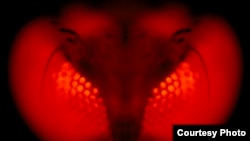A new way to fight malaria aims to eliminate the female mosquitoes that spread the deadly disease.
Scientists have developed mosquitoes that produce almost exclusively male offspring.
Females are the ones that bite. And they are the ones that produce more mosquitoes. The researchers say their technique could wipe out mosquito populations in a few months, without the use of insecticides.
World’s biggest killers
“Mosquitoes have been labeled as the most virulent animal in the world,” said Peter Hotez, dean of the National School of Tropical Medicine at Baylor College of Medicine. “More people die of mosquito-transmitted infections than they do of almost any other type of illness.”
Spraying insecticides is one of the most effective ways to control them, but spraying comes with downsides. It can kill bees and other good insects, and cause environmental damage. And mosquitoes eventually develop resistance to the pesticide.
So Imperial College London researcher Nikolai Windbichler and colleagues are trying a different approach. “We found an Achilles’ heel of these mosquitoes,” he said.
The insects have around 400 copies of a particular gene on the X chromosome. That’s the chromosome that carries the traits making the insects female.
Gene shredder
A creature called a slime mold produces a protein that cuts that gene in one specific place.
The Imperial College London team introduced that slime mold protein into mosquitoes using genetic engineering.
It is designed to turn on when the mosquitoes make sperm. When it does, it cuts the X chromosome in 400 places.
“You can imagine, that’s pretty bad for a chromosome,” Windbichler said. “It gets destroyed. It cannot be passed on to the next generation.”
That leaves only male offspring. And those offspring also would only produce male offspring. Eventually the population would crash.
More Tests Needed
The research is published in Nature Communications.
They have more tests to do to make sure the method is safe and effective. But Windbichler says it beats the alternative.
“If you compare what we are doing to, for example, insecticides, which target any insect species out there, our method is very specific,” Windbichler said. “There may be hundreds of mosquito species in the environment, but our method really only would target that one.”
Baylor’s Peter Hotez, who was not involved in the research, calls it an interesting and exciting finding. But, he added, “It’s still a very early stage.”
Meanwhile, he says, it will take more than just designer mosquitoes to beat malaria.
New drugs and vaccines will be needed, along with bed nets and clearing their breeding grounds with good, old-fashioned puddle-draining.
Scientists have developed mosquitoes that produce almost exclusively male offspring.
Females are the ones that bite. And they are the ones that produce more mosquitoes. The researchers say their technique could wipe out mosquito populations in a few months, without the use of insecticides.
World’s biggest killers
“Mosquitoes have been labeled as the most virulent animal in the world,” said Peter Hotez, dean of the National School of Tropical Medicine at Baylor College of Medicine. “More people die of mosquito-transmitted infections than they do of almost any other type of illness.”
Spraying insecticides is one of the most effective ways to control them, but spraying comes with downsides. It can kill bees and other good insects, and cause environmental damage. And mosquitoes eventually develop resistance to the pesticide.
So Imperial College London researcher Nikolai Windbichler and colleagues are trying a different approach. “We found an Achilles’ heel of these mosquitoes,” he said.
The insects have around 400 copies of a particular gene on the X chromosome. That’s the chromosome that carries the traits making the insects female.
Gene shredder
A creature called a slime mold produces a protein that cuts that gene in one specific place.
The Imperial College London team introduced that slime mold protein into mosquitoes using genetic engineering.
It is designed to turn on when the mosquitoes make sperm. When it does, it cuts the X chromosome in 400 places.
“You can imagine, that’s pretty bad for a chromosome,” Windbichler said. “It gets destroyed. It cannot be passed on to the next generation.”
That leaves only male offspring. And those offspring also would only produce male offspring. Eventually the population would crash.
More Tests Needed
The research is published in Nature Communications.
They have more tests to do to make sure the method is safe and effective. But Windbichler says it beats the alternative.
“If you compare what we are doing to, for example, insecticides, which target any insect species out there, our method is very specific,” Windbichler said. “There may be hundreds of mosquito species in the environment, but our method really only would target that one.”
Baylor’s Peter Hotez, who was not involved in the research, calls it an interesting and exciting finding. But, he added, “It’s still a very early stage.”
Meanwhile, he says, it will take more than just designer mosquitoes to beat malaria.
New drugs and vaccines will be needed, along with bed nets and clearing their breeding grounds with good, old-fashioned puddle-draining.




